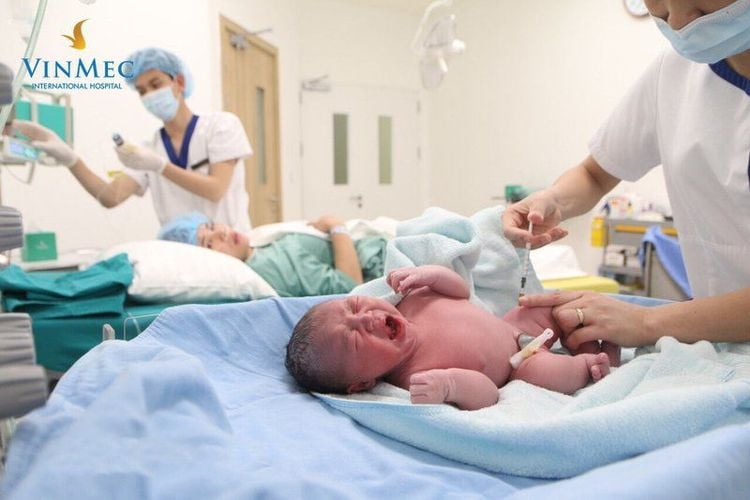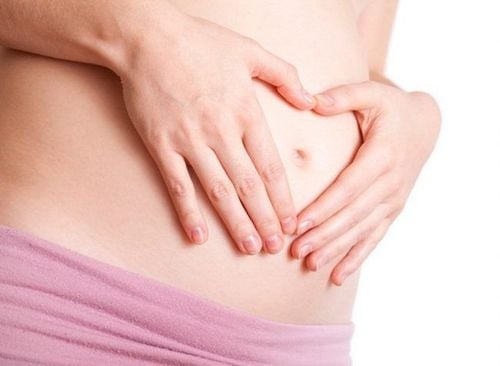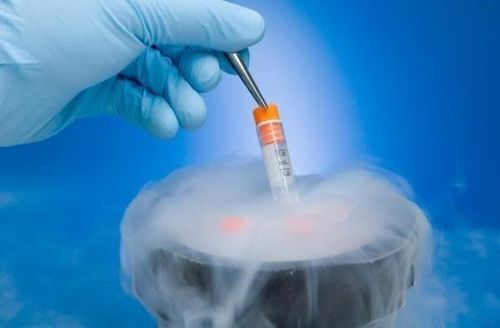This is an automatically translated article.
The article is professionally consulted by MSc, BS. Nguyen Thi Nhu Trang - Reproductive Support Center - Vinmec Times City International General Hospital. The doctor has strengths and experience in performing specialized techniques in the IVF Lab such as ICSI, biopsies for preimplantation genetic diagnosis, thawing embryos, oocytes...Oocyte cryopreservation, also known as oocyte cryopreservation, is a method used to prolong a woman's ability to become pregnant at a predetermined time. Eggs taken from a woman's ovaries are frozen unfertilized and stored for later use.
Frozen eggs can be thawed, combined with sperm in a laboratory to form embryos and implanted in a woman's uterus (in vitro fertilization). Your therapist can help you understand how oocyte cryopreservation works, the potential risks, and whether this fertility preservation method is right for you based on your fertility needs and history. yours. In this article, we will provide everything you need to know about cryopreservation.
Frozen eggs can be thawed, combined with sperm in a laboratory to form embryos and implanted in a woman's uterus (in vitro fertilization). Your therapist can help you understand how oocyte cryopreservation works, the potential risks, and whether this fertility preservation method is right for you based on your fertility needs and history. yours. In this article, we will provide everything you need to know about cryopreservation.
1. What is oocyte cryopreservation?
Egg freezing is one of the ways to prolong a woman's fertility by harvesting and storing eggs for later use.Ovulation cryopreservation is a relatively new assisted reproductive technology that has the potential to give women more options in case they don't want to have children at the moment. Since the first baby conceived using frozen eggs was born in 1986, an estimated 1,000 to 2,000 babies have been born using the technique. Besides, the interest in oocyte cryopreservation of women in particular and couples in general is also increasing. Technological advances have also greatly improved the success rate of oocyte cryopreservation, leading many women to choose it as a tool to prolong their reproductive years. Recent studies have shown that the demand for cryopreservation of oocytes in the United States is increasing, with more than half of fertility clinics in the country providing oocyte cryopreservation.
Proponents of this method argue that oocyte cryopreservation can help women better control their fertility. However, the American Society for Reproductive Medicine (ASRM) says there is not enough information to recommend cryopreservation of oocytes to delay motherhood. ASRM recommends couples should pay attention to the success rate of this method at medical facilities before carrying out the implementation.

Trữ lạnh noãn giúp kéo dài khả năng sinh sản của người phụ nữ
2. Why is it necessary to refrigerate oocytes?
There are 3 main reasons why women consider oocyte cryopreservation, including:Prolonging reproductive age: Most women who use oocyte cryopreservation are not ready to get pregnant right away. this. However, they still want to have the opportunity to have children in the future. There are many reasons why some women delay having children such as waiting for more financial security, wanting to finish school or still looking for a suitable husband.. .. Suppose a woman is in her 30s and is not ready for childbirth. If their eggs are refrigerated from that point on, they can be preserved for a long time. They can then be defrosted and used when the woman is ready to get pregnant, whether she's turned 40 or even 50. Protect fertility during medical treatment: Chemotherapy and radiation therapy for cancer can lead to infertility. However, this can be eliminated if a woman stores a certain number of eggs by cryopreservation prior to treatment. Then, if they have successfully treated the cancer, they can completely fertilize an egg to create an embryo and transfer the embryo into the uterus. Avoiding Embryo Removal During IVF: Embryos left over from IVF are frozen for use or discarded in cases where there is no longer a need. Ovarian cryopreservation allows a woman to fertilize the required number of eggs and keep the remaining oocytes for later use.
3. What is the best age for oocyte cryopreservation?
Scientists recommend freezing eggs when a woman is as young as possible. Because with age, the ovaries and follicles also "age" leading to a decrease in the ability to fertilize an egg along with an increased risk of forming chromosomal abnormal embryos. There are also a number of other factors that can cause freezing of aged oocytes to not yield the desired results.
Tuổi càng trẻ thì chất lượng noãn càng cao
4. How is oocyte cryopreservation performed?
The process of removing an egg from a woman's ovaries is similar to the early stages of in vitro fertilization, which takes about two to four weeks before the eggs are removed. Here are the steps of the egg "harvesting" process:Days 2-3 of the menstrual cycle, the woman is given oral or injected drugs to stimulate the ovaries to produce as many eggs at once as possible (normal muscle mass) may release only one egg cell per month). The doctor will then ask the woman to come in every few days to check on her health. The number and quality of follicles during stimulation were monitored by ultrasound. This process takes about 10 days. Once the eggs have matured, they are removed in a process of about 30 minutes. The woman is anesthetized, then the doctor removes the eggs from the ovaries through a needle inserted through the vaginal wall under ultrasound. Each egg harvest usually yields between 5 and 20 oocytes. Women can go home after an hour or two, but they are advised to do light activity for at least that day.
5. How does oocyte cryopreservation work?
Eggs after aspiration were evaluated for quality and maturity, then frozen by vitrification, brought down to -196oC, using high-concentration frozen preservatives and specialized egg containers. . Ovum can be stored at low temperature for a long time, until the woman needs to use it.When the woman is ready to get pregnant, the eggs will be defrosted. In the case of IVF, the thawed live eggs are combined with sperm in a laboratory to create embryos. Then, 1-2 embryos are placed in the woman's uterus. Embryo culture takes about 3-5 days.
Experts also recommend performing the egg collection process a few times to ensure a sufficient reserve of eggs. A 33-year-old woman should stockpile at least 20-25 frozen oocytes to ensure her chances of becoming pregnant and having a baby later in life. The older women get, the more frozen eggs they need because they have fewer healthy eggs to harvest.

Trứng sẽ được rã đông khi người phụ nữ đã sẵn sàng mang thai
6. What is the success rate of oocyte cryopreservation?
Data on successful oocyte cryopreservation are limited, and there are very few studies showing that in any case, between one-third and two-thirds of egg fertility treatments. freezing can help the woman get pregnant.Some things to keep in mind are:
The younger you are, the higher your chances of getting pregnant and giving birth using frozen eggs. A recent analysis of multiple studies found that a 30-year-old woman who has frozen two to six eggs has a 9 to 24% chance of having children later in life. That's why women are encouraged to freeze a large enough number of eggs. The success rate with cryopreservation of oocytes has improved significantly as technology advances. However, if there is a choice, experts always recommend that freezing the embryos is better. Frozen embryos are more likely to survive, so they are more likely to lead to conception than frozen eggs. Studies also suggest that eggs preserved by rapid freezing, or vitrification, can be more effective than eggs preserved by conventional freezing. Using frozen eggs has also been shown to not increase the risk of birth defects or chromosomal abnormalities in babies.

Trứng đông lạnh không làm ảnh hưởng đến sức khỏe của trẻ khi sinh
7. How much does oocyte cryopreservation cost?
In developed countries such as the United States, the cost of cryopreservation of ovum for one case is equivalent to one round of in vitro fertilization.An oocyte cryopreservation cycle, including egg harvesting, can cost US$5,000 to US$13,000 (subsequent treatments may cost slightly less). If using the drug, it can cost the user about $3,000 more.
In addition, users of this service may have to pay a fee of about 400-500 USD per year for egg storage. And in case they want to use that egg to fertilize and implant in the uterus, they will have to pay an additional $ 5,000 for thawing, fertilizing the eggs and transferring the embryos.
Insurance usually does not cover infertility treatment in most countries unless the woman needs to store eggs to undergo cancer treatment.
For those who want to delay pregnancy now but still want to have a baby later, oocyte cryopreservation may be the optimal choice for them. When you want to use frozen eggs, the eggs need to go through the process of thawing, fertilizing with sperm in a laboratory and implanting in the uterus of a pregnant woman. Doctors may recommend that users use cytoplasmic sperm insemination (ICSI) with a single healthy sperm. The chance of getting pregnant after oocyte cryopreservation is about 30-60% depending on the person's age at the time the eggs were frozen. The older the age, the lower the chance of survival and fertilization of the egg in the future.
Reproductive Support Center - Vinmec International General Hospital provides customers who are in need of egg storage the best medical experience, accompanied by 6-star service quality with outstanding advantages. following:
Being the most modern fertility support center in Vietnam, fully equipped with the most modern facilities to support egg freezing; A team of doctors, embryologists, and technicians working professionally and at international level, regularly training to update knowledge in countries such as the US, Australia, Sweden, Spain, and South Korea. ,...; Stimulation protocols are always individualized for each patient to optimize treatment effectiveness; The fertilization rate of frozen eggs is not different from that of fresh eggs; The procedure of egg aspiration is quick and painless; Customers are fully advised on the steps they will have to go through when performing egg freezing, and are provided with all necessary information about the status of eggs being preserved. Customers are always accompanied by doctors and specialists in making treatment plans. If there is a need for medical examination at Vimec Health System nationwide, please make an appointment on the website to be served.
Please dial HOTLINE for more information or register for an appointment HERE. Download MyVinmec app to make appointments faster and to manage your bookings easily.
Reference sources: mayoclinic.org, babycenter.com












